
Change, like they say, is the only constant thing in the entire universe. Perhaps we have some people that chose to disagree with this saying, that definitely is not for today's discussion. One thing about change is that it could be positive or negative. If it is neutral, I am really not sure if that can be categorized as change. As a rational human, I believe what is desirable is the positive changes. However, when the changes concern climate, it is a different ball game entirely.
Climate change!
Those words are not going away anytime soon. Perhaps not in this generation and the next to come. Several seminars, symposiums, meetings, conventions and the likes have been convened and organized to discuss this issue, and more are still being organized. There have been divergent views on the subject, while some believe it poses a threat to the planet as a whole, some believed it to be a total farce while a whole lot are indifferent. It is really a different stroke for different folks.
I am not putting up this post in order to convince anyone that climate change is real, that is not debatable as far as I am concerned. Just like arguing with flat-earthers, I will let it slide. However, for the benefit of those that are probably hearing this climate change phenomenon for the first time or those that have heard it but yet to understand it, let me take out a little space to explain how it came about.
In the words of National Aeronautics and Space Administration;
Climate change is a change in the usual weather found in a place. This could be a change in how much rain a place usually gets in a year. Or it could be a change in a place's usual temperature for a month or season.
That definition looks simple enough to a layman. There is definitely no doubts that the climate of the global world has changed and still changing with each passing day.
What are the evidence supporting the changing climate?
Like I said earlier, this is not an argument based post but an awareness for those that are yet to understand the climate change issue. The evidence supporting that our climate is changing is quite enormous. From temperature, the speed of wind, precipitation in form of rainfall and snow, humidity and so on.

A typical example of an event that explicitly shows that the global climate is changing is shown in the image on the right-hand side. Over the years, the global average temperature has been increasing with the year 2016 recorded is the warmest year in history with an increase in temperature of about two Fahrenheit. Now, it will not be surprising if some are already saying the increase is very minute. Professionals in the field of thermodynamics know what a minute increase in temperature can do to entropy. Did I tell you that the planet is a closed system?
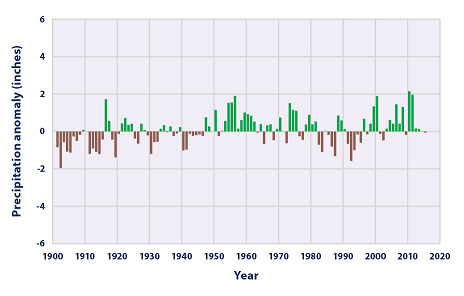
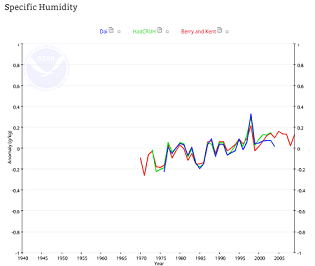
There are several other observable phenomena pointing to the fact that there has been a continuous change in climate, both locally and globally. The implication of these changes is tremendous in almost every area of human endeavours - politically, economically, health impact, biodiversity loss among many other effects.
The next question that will probably be pondering the minds of my readers, especially those that are not already familiar with the phenomenon is "how did we get here?". What exactly is causing all these changes? The answer is not far-fetched. From all of the elements of weather and climate, temperature seems to have the widest implication in that it has direct effects on all other components. The temperature of the planet depends on how much heat it gets from the sun which also depends on how much greenhouse gases present in the atmosphere. If my knowledge of basic physics is not a little rusty, I believe while heat is a scalar quantity, temperature is a vector quantity. I really do hope my physicist friends will not take me up on this.
How does the planet gets its warmth?
There is no doubt the earth, like every other planet, has its only source of energy from the sun. A large percentage of radiation from the sun either gets absorbed or filtered by the ozone layer. The magnitude of radiation that is able to pass through the ozone layer is further reduced by the ability of the clouds to either absorb or reflect back some of the rays. So at the end of the day, only a small percentage of the heat energy from the sun gets to the earth.
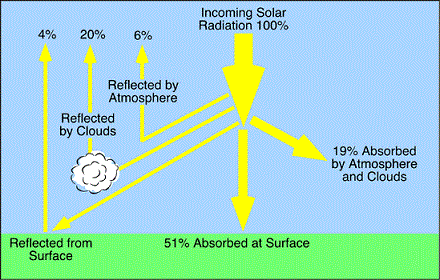
Normal, the process of warming the earth is not the real problem. Without the presence of the greenhouse gases, the whole of the earth's surface would probably be an ice. However, the activities and lifestyles of mankind have led to the release of more of the greenhouse gases into the atmosphere. Over the years, the population of man has expanded and technology has improved to make living easier for all. For example, amount of carbon dioxide released into the atmosphere has more than doubled since industrialization.
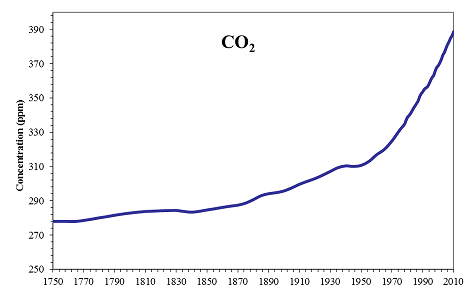
Summary
A quick recap of today's discussion. Climate change has to do with changes in weather conditions of a place. There is an overwhelming evidence to support the fact that the global climate is changing. These include an increase in global annual temperature, irregularity in precipitations, increase in atmospheric humidity among many other observable changes in the components of climate. The majority of these components have s direct correlation with an increase in temperature which in itself brought about by an increase in the presence of greenhouse gases in the atmosphere.
Do you know that this climate change can lead to world war? Ensure you read my next post as I will be making an analysis of how the climate change phenomenon can lead the entire planet to a world war.
Thank you for taking your time to read my post.
References
- National Aeronautics
and Space Adminstration - NOAA National Centers for Environmental Information, State of the Climate: Global Climate Report for Annual 2016
- Precipitation Measurement Mission, NASA
- the guardian: climate change
- world life: effect of climate change
Image credits
image 1
image 2
image 3
image 4

First of all, congratulations on your well written post. I have a few remarks though.
You mention 2016 was the warmest year recorded in history. This means so much as that it was the warmest year since man started recording actual temperature (directly, with thermometers), which was only since 1850.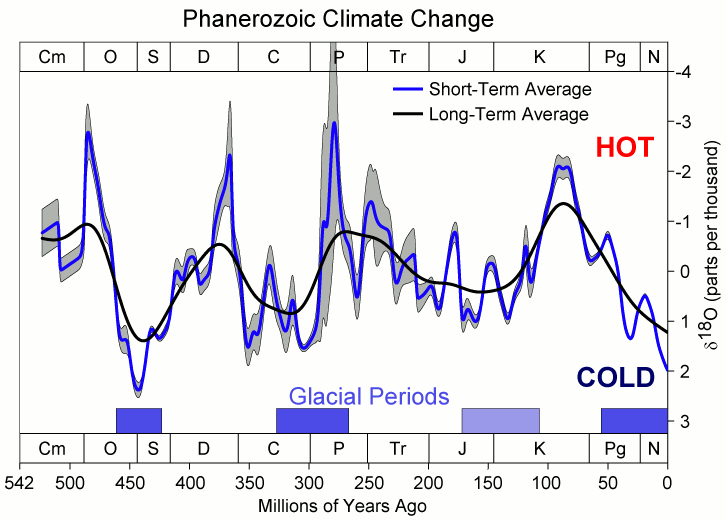
As shown in the above image, Earth has experienced much warmer periods than the last few hundreds of years. I am not trying to debunk the idea of climate change. On the contrary, I am trying to show that climate change has been going on long before our species wandered this world. However, what we are doing is disturbing natural processes by emitting huge amounts of green house gases, cutting rainforests (and therefore increasing erosion and causing soils to become infertile, reducing many species' habitat causing them to become extinct), overfishing etc. and that all in a very short period on a geological time-scale.
You mention that Earth's only energy source is the sun. What about heat generated from radioactive decay by unstable isotopes in the Earth's crust, mantle and core?
You mention only a small percentage of heat energy from the sun gets to the Earth, though the figure you added shows 51% is absorbed by the Earth. It's debatable whether you would find this a small percentage or not ;)
I am looking forward to your reply and the second part of this series.
I am quite impressed that you read my post with utmost attention as to bring out these gray areas. Thanks a lot. Now let me address the issues raised one after the other:
About the earth experiencing warmer periods before now, you are quite right. Perhaps I should have said in the last few hundred years.
About heat generated from radioactive decay in the earth's crust, I do not know how much of heat generated becomes useful to the atmosphere really, you might want to enlighten me in that aspect
I mentioned that only small percentage of heat from the sun gets to the earth, yes. the 51% you are looking at is just a part of the small percentage that got to the earth. The 100% incoming solar radiation is actually a small percentage of original radiation from the sun. A large part has been absorbed or reflected back into space by the cloud and ozone layer.
I will like to hear further from you.
https://www.skepticalscience.com/heatflow.html
This link contains info about the different heatfluxes to the Earth's surface. Particularly figure 4. and comment 31. by Tom Curtis are quite useful. Turns out less than a per cent of the surface heat flow is coming from the Earth's interior (nowadays). My main point was to simply indicate there are more sources of heat than just the sun :)
I agree, this post is very nice!
I was about to shoot a comment along the same lines of yours, concerning the dates. But you were first. ^^ The actual problem consists of the changes induced by humans, as you said, which thus focus on a smaller time scale. :)
I agree there are nature's automated changes to climate since the inception of the earth, the focus here is the human-induced changes that serve to disrupt the automation. The consequences might be more disastrous in the long run.
This is a good research work. Thanks
thanks brother
Climate change has really posed a great issue for humankind. I once read about a prediction that was made; that even Greenland which has been known for being ice-covered almost all year round would experience an ice-free summer by 2050.
Even the average temperature of the earth is on the increase, as greenhouse gases are ever on the increase. I guess we really have an issue at hand buddy.
I believe the earth has its cycle just like living organisms. The activities of man will eventually put an end to the planet. Enough said
Exactly buddy
The climate change factors has become like an accelerating car moving over a cliff.
With lot of little activities here and there that we personally do to contribute to our earth climate fall.
My focus is the human induced climate change factors . I did read about our carbon footprint on @alale blog, and found on some large scale how there are many things we do, that we do not even know are disastrous to our environment .
definitely! The focus here is the human aspect. The quantity of emission of ghgs compared to anthropogenic emission is not significant. Afterall, there is very little we can do to mitigate natural emissions :)